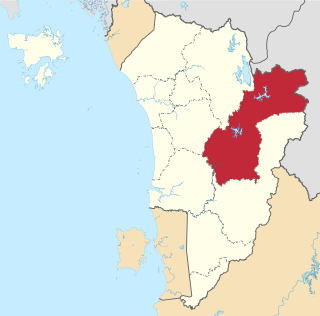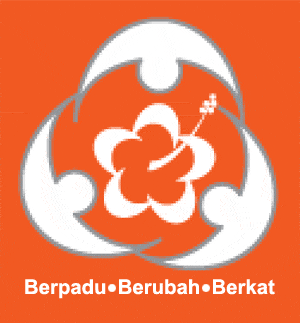Related Research Articles

Kelantan is a state in Malaysia. The capital, Kota Bharu, includes the royal seat of Kubang Kerian. The honorific name of the state is Darul Naim. Kelantan is the only state outside of East Malaysia that does not use the term district in its second-level administrative division. Instead, the divisions are called colonies or collectivities with one autonomous subdistrict.

Kedah, also known by its honorific Darul Aman and historically as Queda, is a state of Malaysia, located in the northwestern part of Peninsular Malaysia. The state covers a total area of over 9,000 km2, and consists of a mainland portion and the Langkawi islands. The mainland has relatively flat terrain, which is used to grow rice, while Langkawi is composed of mostly of uninhabited islands.

Bentong, the seat of Bentong District, is a town located in western Pahang, Malaysia, at the border with the state of Selangor in the west and the state of Negeri Sembilan in the south.

Gurun is a mukim and a small town in Kuala Muda District, Kedah, Malaysia. "Gurun" in English means desert, however the town does not resemble in the slightest the meaning of its English translation. Rather, it derived its name from the word "gerun", which means terrify or "kurun" meaning elephant in the Siamese dialect. These words are associated with an incident during the reign of King Ekataat’s grandsons, Sultan Jaafar Mad Azam Syah, Sultan of the Islamic State of Ayutthia, who was killed in 1876 by the invading Thai armies when they crushed his body using an elephant. This incident took place behind the current Gurun Police Station.

Sik is a district in Kedah, Malaysia. It is largest district in Kedah.

The Malaysian Siamese are an ethnicity or community who principally resides in Peninsular Malaysia which is a relatively homogeneous cultural region to southern Burma and southern Thailand but was separated by the Anglo-Siamese Treaty of 1909 between the United Kingdom and the Kingdom of Siam. The treaty established the modern Malaysia-Thailand Border which starts from Golok River in Kelantan and ends at Padang Besar in Perlis. Before this, there was a mass migration of Siamese from Nakhon Si Thammarat to the northern Malay states seeking refuge following a civil war waged by Taksin of Thonburi against Nakhon ruler Nu in 1769.
Tan Sri Zainuddin bin Maidin was a Malaysian politician and the former Information Minister in the Malaysian cabinet representing United Malays National Organisation (UMNO) in the Barisan Nasional (BN) coalition government. He was the member of the Parliament of Malaysia for the Merbok constituency for one term, from 24 March 2004 to 8 March 2008. In 2018, he quits UMNO and be part of Pakatan Harapan (PH) coalition government. He is also the former Chief Editor of Utusan Melayu-turned-fierce critic, the oldest Malay language newspaper in Malaysia.

The People's Alliance was an informal Malaysian political coalition and successor to Barisan Alternatif (BA). The political coalition was formed by the People's Justice Party (PKR), Democratic Action Party (DAP), and Pan-Malaysian Islamic Party (PAS) on 1 April 2008, after the 12th Malaysian general election, having previously formed the Barisan Alternatif in the 10th general election. On 20 April 2010, the Sarawak National Party (SNAP) officially joined as a member of the Pakatan Rakyat after being expelled from Barisan Nasional, but quit the coalition on 6 May 2011. The DAP declared the coalition "dead" on 16 June 2015, citing the inability of the rest of the alliance to work with PAS, after PAS's congress passed the motion to sever ties with DAP without debate. It was succeeded by Pakatan Harapan and Gagasan Sejahtera.

Dato' Ngeh Koo Ham, also known as James Ngeh, is a Malaysian politician, advocate and solicitor who has served as the Member of Parliament (MP) for Beruas since March 2008. He served as Speaker of the Perak State Legislative Assembly from July 2018 to May 2020, Member of the Perak State Executive Council (EXCO) in the Pakatan Rakyat (PR) administration under former Menteri Besar Mohammad Nizar Jamaluddin from March 2008 to the collapse of the PR administration in February 2009 and Member of the Assembly (MLA) for Sitiawan from March 2004 to May 2018. He is a member of the Democratic Action Party (DAP), a component party of the Pakatan Harapan (PH) and formerly PR, Barisan Alternatif (BA) and Gagasan Rakyat (GR) coalitions. He was also Deputy Secretary-General of DAP, Member of the Central Executive Committee (CEC) of DAP and State Chairman of DAP of Perak.

Phahrolrazi bin Mohd Zawawi is a Malaysian politician who served as Member of the Kedah State Legislative Assembly (MLA) for Alor Mengkudu from May 2018 to August 2023 and for Pengkalan Kundor from March 2008 to May 2018 as well as from December 1999 to March 2004, Leader of the Opposition of Kedah from July 2020 to October 2022 and Member of the Kedah State Executive Council (EXCO) in the Pakatan Rakyat (PR) state administration under former Menteri Besar Azizan Abdul Razak from March 2009 to February 2012. He is a member of the People's Justice Party (PKR), a component party of the Pakatan Harapan (PH) coalition and was an independent, a member of the National Trust Party (AMANAH), also a component party of the PH coalition and a member of the Malaysian Islamic Party (PAS), a former component party of the PR coalition. He also served as State Chairman of AMANAH of Kedah from November 2019 to his removal from the party in October 2022. He was also the State Deputy Chairman of AMANAH of Kedah and State Deputy Commissioner of PAS of Kedah.

Apa Khabar Orang Kampung is a 2007 Malaysian documentary by Amir Muhammad. It was produced by Da Huang Pictures. Like its predecessor The Last Communist, it was banned in its home country but screened in several international film festivals. It premiered at the Berlinale in 2006.

Mahfuz bin Omar is a Malaysian politician who has served as Chairman of the Farmers' Organisation Authority (FOA) since May 2023. He served as the Deputy Minister of Human Resources in the Pakatan Harapan (PH) administration under former Prime Minister Mahathir Mohamad and former Minister M. Kulasegaran from July 2018 to the collapse of the PH administration in February 2020 as well as the Member of Parliament (MP) for Pokok Sena from November 1999 to March 2004 and again from March 2008 to November 2022. He is a member and one of the Vice Presidents of the National Trust Party (AMANAH), a component party of the PH coalition and was a member of the Malaysian Islamic Party (PAS), then a component party of formerly the Gagasan Sejahtera (GS), Pakatan Rakyat (PR), Barisan Alternatif (BA) and Angkatan Perpaduan Ummah (APU) coalitions.

Hashim bin Jasin is a Malaysian politician from the Malaysian Islamic Party (PAS), a component party of the Perikatan Nasional (PN) coalition. He has served as the 4th Spiritual Leader of PAS since October 2016 after the death of his predecessor Haron Din in September 2016 and its State Commissioner of Perlis from 1991 to 2013. Besides, he served as the Member of Parliament (MP) for Arau after his victory in the 1998 Arau by-elections until the 1999 general election in November 1999 and Member of the Perlis State Legislative Assembly (MLA) for Sanglang from November 1999 to the 2013 general election in May 2013.

The 14th Kedah State election was held on 9 May 2018, concurrently with the 2018 Malaysian general election. The previous state election was held on 5 May 2013. The state assemblymen is elected to 5 years term each.
Kampung Padang Balang or Padang Balang is the oldest surviving traditional village in Kuala Lumpur, Malaysia. It is circumferenced by Gombak Road, Jalan Kampung Bandar Dalam, Duta–Ulu Klang Expressway (DUKE), Kuala Lumpur Middle Ring Road 2 and Gombak River.
Lim Yi Wei is a Malaysian politician who has served as a member of the Selangor State Legislative Assembly (MLA) for Kampung Tunku since May 2018. She is a member of the Democratic Action Party (DAP), a component party of the Pakatan Harapan (PH) coalition.

The 2020–2022 Malaysian political crisis was triggered after several Members of Parliament (MPs) of the 14th Malaysian Parliament changed party support, leading to the loss of a parliamentary majority, the collapse of two successive coalition governments, and the resignation of two Prime Ministers. The political crisis culminated in a 2022 snap general election and eventual formation of a coalition government. This crisis ended in 2022 and Malaysian political crisis continued in the State of Sabah known as 2023 Kinabalu Move.

Ahmad Tarmizi bin Sulaiman is a Malaysian politician who has served as the Member of Parliament (MP) for Sik since May 2018. He was Deputy President of the Malaysian Consultative Council of Islamic Organisation (MAPIM). He is a member of the Malaysian Islamic Party (PAS), a component party of the Perikatan Nasional (PN), formerly Gagasan Sejahtera (GS) and Pakatan Rakyat (PR) coalitions.
Badrul Hisham bin Abdullah is a Malaysian politician. He served as Member of the Selangor State Legislative Assembly (MLA) for Pelabuhan Klang from March 2008 to May 2013. He is a member of United Malays National Organisation (UMNO), a component party of Barisan Nasional (BN) and was a member of People's Justice Party (PKR), a component party of Pakatan Rakyat (PR).
References
- ↑ Said, Aripin (2008). "16". 366, A Collection of Malaysian Folk Tales. Utusan Publication. p. 160. ISBN 9789676121295 . Retrieved 20 January 2025.
- ↑ Satow, Ernest Mason (2016). Ian Ruxton (ed.). The Diaries of Sir Ernest Mason Satow, 1883-1888; A Diplomat In Siam, Japan, Britain and Elsewhere. ISBN 9781365462429 . Retrieved 20 January 2025.
- 1 2 "Kampung Jering Chinese Methodist Church". Methodist Church of Malaysia. Retrieved 20 January 2025.
- ↑ Loh, Ivan (20 February 2014). "Ex-Kampung Jering DAP branch chairman shot dead". The Star. Retrieved 20 January 2025.
- ↑ "Former DAP branch chairman shot dead". Malay Mail. 20 February 2014. Retrieved 20 January 2025.
- ↑ Sagaran, P. Chandra (26 February 2014). "DAP man's murder not politically motivated, cops say". Malay Mail. Retrieved 20 January 2025.
- ↑ Annual Report of the Geological Survey Malaysia, 1973. 1973. p. 26. Retrieved 20 January 2025.